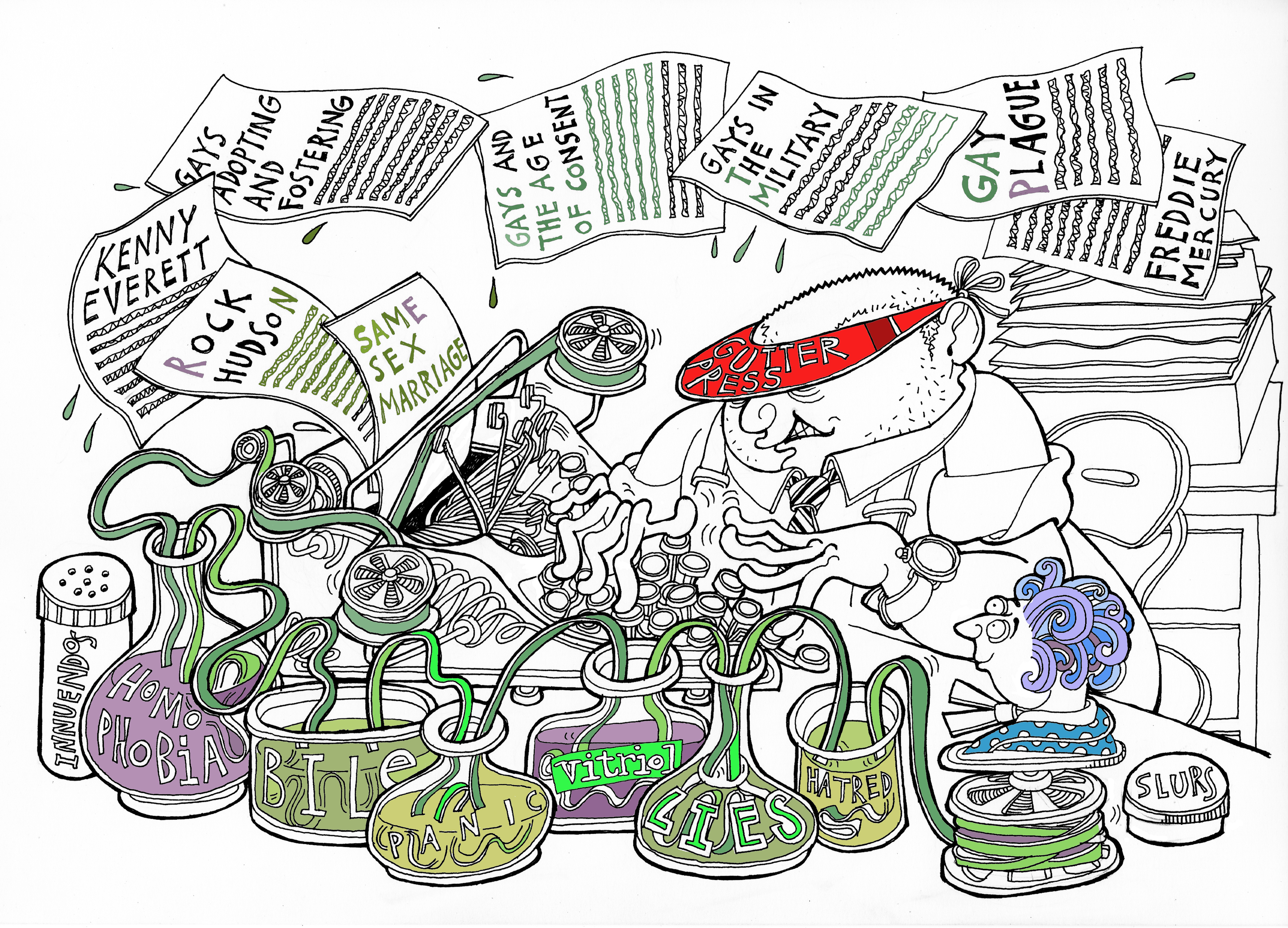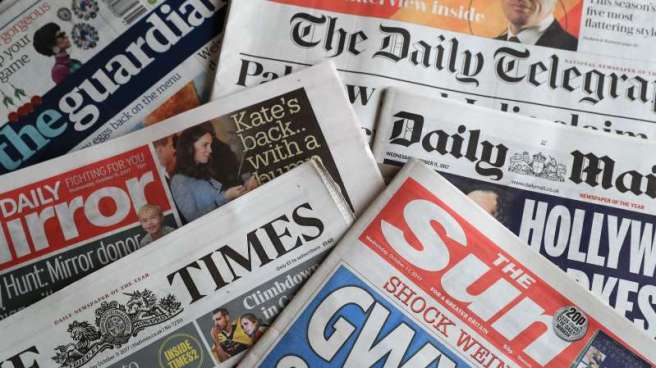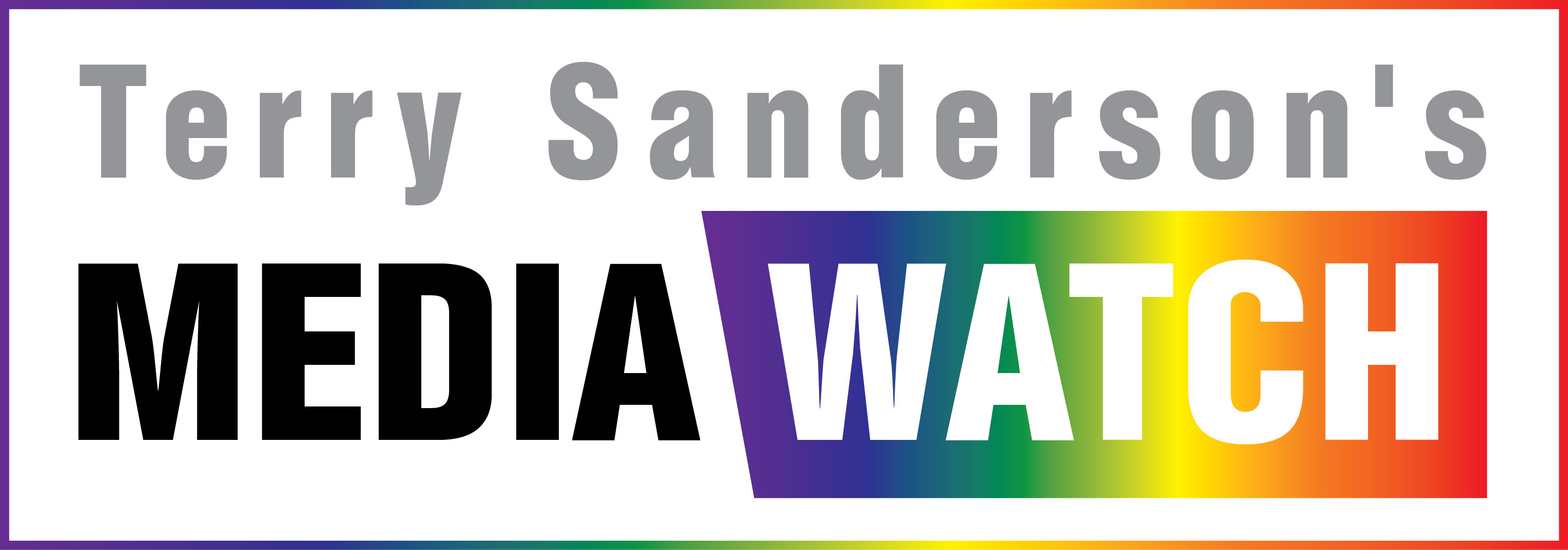
The Mediawatch column, which examined and reported the way LGBT issues were covered by the mainstream media, ran in Gay Times for almost 25 years from 1983. I researched and wrote all but three of those columns (having taken a sabbatical for a round-the-world trip) and through it I got a good overview of how the gay rights struggle developed during that vital period.
Reading through those columns now, it is clear that they coincided with an era of law reform and social development that fundamentally changed life for LGBT people in Britain.
I had been writing for the emerging gay press for some time on a freelance basis during the late 1970s and 1980s, and occasionally contributed to the monthly magazine Him that was published by Millivres. Him had started out as a male pin-up magazine but had gradually morphed into a more wide-ranging gay periodical, seeking to fill the void left by the death of much-missed and lamented Gay News.
Him, in turn, became Him/Gay Times and eventually just Gay Times (and later, unaccountably, GT before becoming Gay Times again under new ownership), a title that is, at the time of writing, still extant and widely available.
I had written all sorts of features in the many gay newspapers and magazines that had sprung up to serve our community. Some of these titles were created more in hope than with a sound financial foundation. Some were successful – Capital Gay ran from 1981 to 1995 – though it just served the thriving London gay scene of the time– others lasted only for a few editions before they folded.
I contributed everything from book reviews to humorous pieces, from political comment to self-help advice.
By the time Him reached its 62nd edition, the editor asked if I would like to write some comment on the increasingly disturbing way that the straight press was covering gay issues.
The modern idea of a gay community was at that time still in its relative infancy. It was far from confident or secure. There were still legal restrictions and social penalties for those who dared to come out. How these issues were being presented in the media was a matter of great concern. After all, if big issues need to be debated, they need to be debated fairly and with all sides having a say.
The British press was not happy with that idea. Except for a few honourable exceptions, it was, and remains, deeply conservative.
But it seemed the newspapers were having a much bigger problem than most of their readers were in accepting that the world was changing and that LGBT people were gradually finding their place in society. The tabloids might be spitting feathers about the sudden, unashamed and assertive visibility of homosexuals but the population at large was generally a lot more sanguine – or maybe it was just indifferent. If it didn’t directly affect them – and mostly it didn’t – they weren’t really perturbed.
All the same, as gay rights inched forward, the tabloids became increasingly aggressive in their attacks on what they regarded as a highly undesirable and depraved lifestyle. Religious bodies, too, became much more active and hostile on the issue.
That first modest “Mediawatch” column went down well, so the editor asked if I would like to make it a regular feature. I jumped at the chance although, of course, I could not have known, when the offer was made, that I was letting myself in for almost a quarter of a century of exposure to the most toxic bile that Fleet Street could spew out.
When I first started reporting on the press for Him (and then Gay Times), there was, of course, no internet to make the job easy, no websites, no social media. If you wanted to know what was going on in the world you either tried to catch the radio or TV news bulletins (at fixed times each day, no 24 hour rolling news channels) or you bought a newspaper.
In view of this, sales of print newspapers at that time were much greater than they are today. Consequently, this made the popular tabloids very powerful. Papers like The Sun and The Daily Mail had significant circulations that made them politically influential. Because of the fear they inspired in politicians who worried about getting on their wrong side, they could influence the course of elections. That was the perception of some of the parliamentarians, anyway.
When I began the column I didn’t get expenses, so I had to pay for the papers myself. Over the month, that amounted to more than the fee I was receiving for writing the articles. So, to save money, I would go to the library and search through the papers there for free, photocopying anything relevant.
I would sit there frustrated as some old guy who had come in to shelter from the cold hogged the papers while he went through them in minute detail, reading everything word for painful word.
I would pick up discarded newspapers on buses and trains, ask work colleagues who bought papers to save them for me, and then spend hours in WH Smith flicking through the current affairs magazines.
Later, when I got expenses to pay for the research, I would have giant mountains of newspapers in the house, difficult to get rid of before the days of recycling.
My newsagent was more than happy with all this. When I went on holiday for a fortnight, he would save all the papers for me and I would then have to carry the mountain home in the back of the car, sometimes requiring two journeys.
Homosexuality was becoming a big issue, and this was reflected in the papers. As Parliament struggled with various elements of law reform – the age of consent, Section 28, civil partnerships and then marriage, adoption and fostering, gays in the military, protection from discrimination at work and in the provision of goods and serves – I was able to reflect through the Mediawatch column where the opposition was coming from. It was mainly the churches and religiously-inspired politicians but there was also a sort of crude revulsion in many parliamentarians and local councillors that they did not hesitate to express. Things were being said quite openly in Parliament and local council meetings that today would be illegal.
Nowadays the churches try to rewrite history and make out that they did not try to derail progress. The Church of England tries to say that it approves of civil partnerships, but not of marriage for same-sex couples. But you will see that when the civil partnership legislation was going through parliament, the bishops did their best to stop it.
Every anti-gay bigot could be assured of a platform in the red-tops (as the tabloid papers were called). They claimed they were simply reflecting societal attitudes and, indeed, the crudity of their homophobia may have been more widespread than we imagined. Maybe it still is, but suppressed by the “political correctness” that remains to this day such a bogeyman for the press, although now it is more likely to be referred to as “woke” – the new stick with which to beat minorities..
Being an optimist, I prefer to think that there has been a real change in attitudes and that while homophobia still bubbles under the surface for some people, for most it is no longer an issue.
When AIDS came along, it brought out the very worst malignancy and vindictiveness in the British tabloid press. The editors who, at the time, sought to spread misinformation about this disease and to torment its victims, should hang their heads in shame. They could have helped to curb the spread of HIV with information and reassurance. They chose to do the opposite.
There were many other issues – same-sex kisses in soap operas, outing, gay parenting, the use of gay lives to score political points – all provided strong material for the Mediawatch column.
But reading through the columns now, one can see that although there were some mighty bumps along the way, the trajectory since the reform of 1967 has been inevitably upwards, leading eventually to just about legal equality. The hateful propaganda that the tabloids published day in and day out through the 1980s and 90s did not seem to stick in the minds of many of their readers. They reinforced existing prejudice, but didn’t seem to incite new hatred.
We haven’t gained complete equality yet, and there is still plenty of hostility in some quarters, but not enough to make a satisfying life completely impossible for gay people.
Our liberation has been achieved in a relatively short time. It is that speed that scares me a little. We gained it all so quickly that I wonder if it could all be taken away just as quickly. Our rights are not quite as solid as we may like to think. We see from other parts of the world that gains that were made recently are now being rolled back.
Our religious enemies continue to seek opportunities to reverse our gains and they are making progress.
Anyway, what is presented here is a historical record of one aspect of the fantastically successful struggle for gay rights. You will see contemporary reactions to events as they unfolded and how those opinions changed and became more sophisticated over the years.
Sometimes it felt as though every step forward resulted in a concomitant reverse. But perseverance matters – if at first you don’t succeed and all that.
If anyone has the stamina to read through the whole of this oeuvre from beginning to end, the impression they will come away with is one of progress, not only in societal attitudes but within the media. They will see a gradual movement from hostility and abuse to a semblance of reasonable debate. They will perceive a move from the crude dismissal and patronising ‘tolerance’ that was common in politics, the media and the church, to a real engagement with the issues. A generational shift is apparent as those from an earlier, less tolerant, era pass from the battleground to be replaced by others who are at least prepared to listen and consider. The younger generation that emerged during this time was less hung-up about sex, less inclined to condemn. In many ways, Britain has shaken off its traditional inability to talk about sex and sexuality.
By insisting on our rights, we have created a peaceful revolution in the way LGBT people are regarded and how they can live their lives. Despite the best efforts of a poisonous and insulting press, aggressive religious leaders and unsympathetic politicians, we have reached a place now that I never thought I would see in my lifetime.
Terry Sanderson, London 2018

